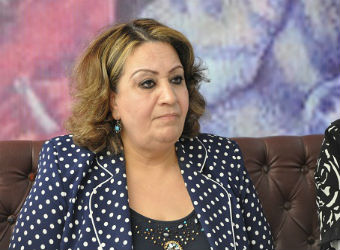
(AFP PHOTO / MAHMOUD KHALED)
Special Year End 2014 Feature:
Early in December, President Abdel Fattah Al-Sisi met with a group of journalists, editors and TV anchors for an open discussion on many topics regarding journalism in Egypt. Al-Sisi reportedly responded to the reporters’ questions and asked them to create a list of recommendations to be addressed.
Meanwhile, Reporters Without Borders (RWB) ranked Egypt as the second country in the world for the number of journalists arrested. In an annual report released last week, RWB also described Egypt as the fourth “biggest prison” for journalists.
Al-Sisi also discussed two major topics in his five-hour meeting with journalists: the role of the information ministry; and the issuing of a new decree criminalising those who incite against the “two revolutions”, referring to the ousting of Hosni Mubarak in 2011 and that of Mohamed Morsi in 2013.
Mohamed Elhawary, editorial secretary of Al-Masry Al-Youm newspaper, said the topics discussed in the meeting were limited and targeted to a customised segment of journalism practitioners, and it was nowhere near the key challenges confronted by the majority of journalists.
On top of those challenges he noted there is a need for advanced discussions on several issues currently facing journalists in Egypt. This includes: the random arrests and detention for journalists; the prohibiting of international organisations’ activities in Egypt according to the amended penal code; that the journalists’ syndicate and local organisations do not provide the same activities and trainings for journalists; the huge downsizing across many newspapers in the second half of 2014, after many businessmen decided to stop investing in news outlets, affected by changes in the political situation of the country.
Salma Khattab, an investigative journalist at Shorouk newspaper, said that 2014 was one of the most challenging years for journalism in Egypt. Khattab mentioned several acts of censorship carried out by editors and managers in an attempt to protect their personal interests and the sustainability of their organisations.
Muhammad Ghamrawy, who currently writes for the Washington DC based Al-Monitor, said that while he was covering the clashes between protesters and police on the third anniversary of the 25 January Revolution, the police shot teargas and live bullets at the photographers, including himself. The paper, however, did not provide them with any protective materials in advance or assessed the risk before they went on the reporting trip.
Agitated by the incidents that affected his work career, Ghamrawy said: “I would like to see the safety issue and work stability issue both on top of the discussions of reforming journalism in Egypt.” He added there should be working contracts for those who spent three months working for a paper.

